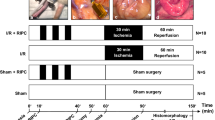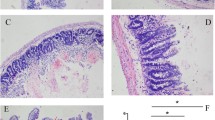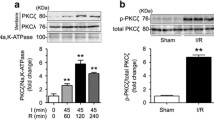Abstract
Background
The inflammatory immune response plays an important role in mesenteric ischemia and ischemia–reperfusion injury. Toll-like receptor 4 (TLR4) is a critical receptor in transduction of the inflammatory response and plays an important role in intestinal homeostasis. Tumor necrosis factor receptor-associated factor 6 (TRAF6), known as a key adaptor protein downstream of TLR4, is involved in the inflammatory response by activating multiple apoptotic signaling pathways. However, mechanisms of the suppressor of cytokine signaling-1 (SOCS-1) in regulating cell inflammation and apoptosis are still obscure.
Objectives
To investigate the TLR4–TRAF6 signaling pathway in intestinal ischemia and reperfusion injury, as well as SOCS-1 expression after ischemic preconditioning in the rat intestine.
Methods
The small bowel ischemia, ischemia–reperfusion, and preconditioning models were induced using ligation of the superior mesenteric artery in male Sprague–Dawley rats; then, the mRNA and protein levels of TLR4, TRAF6, and SOCS-1 were analyzed using real-time PCR, Western blot, and immunohistochemistry, respectively.
Results
The expression of TLR4 and TRAF6 was gradually increased with increasing intestinal ischemia duration, but increased substantially after ischemia–reperfusion injury. After ischemic preconditioning, TLR4 and TRAF6 expressions decreased; however, expression of SOCS-1 and the TLR4–TRAF6 pathway inhibitor was increased.
Conclusion
These data show that ischemic preconditioning may induce the activation of SOCS-1 to inhibit the TLR4–TRAF6 signaling pathway, thereby playing a protective role in ischemia–reperfusion injury.





Similar content being viewed by others
References
Akyildiz HY, Sozuer E, Uzer H, Baykan M, Oz B. The length of necrosis and renal insufficiency predict the outcome of acute mesenteric ischemia. Asian J Surg. 2015;38:28–32.
Yadav V, Hussain A, Sahoo K, Awasthi V. Remediation of hemorrhagic shock-induced intestinal barrier dysfunction by treatment with diphenyldihaloketones EF24 and CLEFMA. J Pharmacol Exp Ther. 2014;351:413–422.
Williams TM, Waksman R, De Silva K, Jacques A, Mahmoudi M. Ischemic preconditioning—an unfulfilled promise. Cardiovasc Revasc Med. 2015;16:101–108.
Shi LB, Huang JH, Han BS. Hypoxia inducible factor-1 mediates protective effects of ischemic preconditioning on ECV-304 endothelial cells. World J Gastroenterol. 2007;1316:2369–2373.
Elshiekh M, Kadkhodaee M, Seifi B, Ranjbaran M, Ahghari P. Ameliorative effect of recombinant human erythropoietin and ischemic preconditioning on renal ischemia reperfusion injury in rats. Nephrourol Mon. 2015;7:e31152.
He GZ, Zhou KG, Zhang R, Chen XF. The effects of n-3 PUFA and intestinal lymph drainage on high-mobility group box 1 and Toll-like receptor 4 mRNA in rats with intestinal ischaemia–reperfusion injury. Br J Nutr. 2012;108:883–892.
Salcedo R, Cataisson C, Hasan U, et al. MyD88 and its divergent toll in carcinogenesis. Trends Immunol. 2013;34:379–389.
Jakus PB, Kalman N, Antus C, et al. TRAF6 is functional in inhibition of TLR4-mediated NF-κB activation by resveratrol. J Nutr Biochem. 2013;24:819–823.
Starska K, Forma E, Lewy-Trenda I, Stasikowska O, Brys M, Krajewska W. The expression of SOCS1 and TLR4-NF-κB pathway Molecules in neoplastic cells as potential biomarker for the aggressive tumor phenotype in laryngeal carcinoma. Folia Histochem Cytobiol. 2009;47:401–410.
Zhou X, Liu Z, Cheng X, Zheng Y, Zeng F, He Y. Socs1 and Socs3 degrades Traf6 via polyubiquitination in LPS-induced acute necrotizing pancreatitis. Cell Death Dis. 2015;6:e2012.
Song MY, Tian FF, Liu H, et al. Expression of SOCSs and TLRs in the hippocampus of pentylenetetrazole kindling model. Clin Lab. 2014;60:233–240.
Lloris Carsi JM, Cejalvo Lapeña D, Toledo AH, Zaragoza Fernandez C, Toledo Pereyra LH. Pentoxifylline protects the small intestine after severe ischemia and reperfusion. Exp Clin Transplant. 2013;11:250–258.
Minjae K, Sang WP, Mihwa K, Vivette D, Thomas L. Isoflurane postconditioning protects against intestinal ischemia-reperfusion injury and multi-organ dysfunction via transforming growth factor-β1 generation. Ann Surg. 2012;255:492–503.
Jr StefanToth, Pekarova Timea, Varga Jan, et al. Trehalase as a possible marker of intestinal ischemia–reperfusion injury. Acta Biochim Pol. 2013;60:411–416.
Chiu CJ, McArdle AH, Brown R, et al. Intestinal mucosal lesion in low-flow states. I. A morphological, hemodynamic, and metabolic reappraisal. Arch Surg. 1970;101:478–483.
Chen Y, Miao L, Yao Y, et al. Dexmedetomidine ameliorate CLP-induced rat intestinal injury via inhibition of inflammation. Mediat Inflamm. 2015;2015:918361.
Chen W, Wang X, Huang LI, Liu BO. Hepcidin in non-alcoholic fatty liver disease regulated by the TLR4/NF-κB signaling pathway. Exp Ther Med. 2016;11:73–76.
Deng W, Deng Y, Deng J, Wang DX, Zhang T. Losartan attenuated lipopolysaccharide-induced lung injury by suppression of lectin-like oxidized low-density lipoprotein receptor-1. Int J Clin Exp Pathol. 2015;8:15670–15676.
Blazquez-Medela AM, Garcia-Sanchez O, Quiros Y, et al. Increased Klk9 urinary excretion is associated to hypertension-induced cardiovascular damage and renal alterations. Medicine. 2015;94:e1617.
Yang CC, Hsu SP, Chen KH, Chien CT. Effect of adenoviral catalase gene transfer on renal ischemia/reperfusion injury in rats. Chin J Physiol. 2015;58:420–430.
Stack J, Hurst TP, Flannery SM, et al. Poxviral protein A52 stimulates p38 mitogen-activated protein kinase (MAPK) activation by causing tumor necrosis factor receptor-associated factor 6 (TRAF6) self-association leading to transforming growth factor β-activated kinase 1 (TAK1) recruitment. J Biol Chem. 2013;288:33642–33653.
Akcilar R, Akcilar A, Kocak C, et al. Effects of Ukrain on intestinal apoptosis caused by ischemia-reperfusion injury in rats. Int J Clin Exp Med. 2015;8:22158–22166.
Fan Z, Yao J, Li Y, Hu X, Shao H, Tian X. Anti-inflammatory and antioxidant effects of curcumin on acute lung injury in a rodent model of intestinal ischemia reperfusion by inhibiting the pathway of NF-κb. Int J Clin Exp Pathol. 2015;8:3451–3459.
Marques GM, Rasslan R, Belon AR, et al. Pentoxifylline associated to hypertonic saline solution attenuates inflammatory process and apoptosis after intestinal ischemia/reperfusion in rats. Acta Cir Bras. 2014;29:735–741.
Akdogan RA, Kalkan Y, Tumkaya L, Alacam H, Erdivanli B, Aydin I. Influence of infliximab pretreatment on ischemia/reperfusion injury in rat intestine. Folia Histochem Cytobiol. 2014;52:36–41.
Moore-Olufemi SD, Olufemi SE, Lott S. Intestinal ischemic preconditioning after ischemia/reperfusion injury in rat intestine: profiling global gene expression patterns. Dig Dis Sci. 2010;55:1866–1877.
Juraver-Geslin HA, Durand BC. Early development of the neural plate: new roles for apoptosis and for one of its main effectors caspase-3. Genesis. 2015;53:203–224.
Chu W, Li S, Wang S, Yan A, Nie L. Ischemic postconditioning provides protection against ischemia–reperfusion injury in intestines of rats. Int J Clin Exp Pathol. 2015;8:6474–6481.
Arumugam TV, Okun E, Tang SC, Thundyil J, et al. Toll-like receptors in ischemia-reperfusion injury. Shock. 2009;32:4–16.
Moses T, Wagner L, Fleming SD. TLR4-mediated Cox-2 expression increases intestinal ischemia/reperfusion-induced damage. J Leukoc Biol. 2009;86:971–980.
Victoni T, Coelho FR, Soares AL, et al. Local and remote tissue injury upon intestinal ischemia and reperfusion depends on the TLR/MyD88 signaling pathway. Med Microbiol Immunol. 2010;199:35–42.
Luo H, Guo P, Zhou Q. Role of TLR4/NF-κB in damage to intestinal mucosa barrier function and bacterial translocation in rats exposed to hypoxia. PLoS One. 2012;7:e462–e491.
Chassin C, Hempel C, Stockinger S, et al. MicroRNA-146a-mediated downregulation of IRAK1 protects mouse and human small intestine against ischemia/reperfusion injury. EMBO Mol Med. 2012;4:1308–1319.
De Araujo RF, Jr ReinaldoMP, Brito GA, et al. Olmesartan decreased levels of IL-1β and TNF-α, down-regulated MMP-2, MMP-9, COX-2, RANK/RANKL and up-regulated SOCs-1 in an intestinal mucositis model. PLoS One. 2014;9:e114923.
Rosentreter D, Funken D, Reifart J, Mende K, Rentsch M, Khandoga A. RIP1-dependent programmed necrosis is negatively regulated by caspases during hepatic ischemia–reperfusion. Shock.. 2015;44:72–76.
Ofengeim D, Yuan J. Regulation of RIP1 kinase signalling at the crossroads of inflammation and cell death. Nat Rev Mol Cell Biol. 2013;14:727–736.
Koshinuma S, Miyamae M, Kaneda K, Kotani J, Figueredo VM. Combination of necroptosis and apoptosis inhibition enhances cardioprotection against myocardial ischemia–reperfusion injury. J Anesth. 2014;28:235–241.
Bruhn RS, Distelmaier MS, Hellmann-Sokolis M, et al. Early detection of acute mesenteric ischemia using diffusion-weighted 3.0-T magnetic resonance imaging in a porcine model. Invest Radiol. 2013;48:231–237.
Ben DF, Yu XY, Ji GY, et al. TLR4 mediates lung injury and inflammation in intestinal ischemia–reperfusion. J Surg Res. 2012;174:326–333.
Li C, Li YS, Xu M, et al. Limb remote ischemic preconditioning for intestinal and pulmonary protection during elective open infrarenal abdominal aortic aneurysm repair: a randomized controlled trial. Anesthesiology. 2013;118:842–852.
Pasupathy S, Homer-Vanniasinkam S. Surgical implications of ischemic preconditioning. Arch Surg. 2005;140:405–409.
Acknowledgments
This study was supported by the Department of Education Research Program of Sichuan Province, China, No. 10ZB120. I would like to extend my sincere thanks to all those who have helped me make this thesis possible and better. I gratefully acknowledge BioMed Proofreading LLC for the English copy editing of my manuscript.
Author information
Authors and Affiliations
Corresponding author
Ethics declarations
Conflict of interest
All authors concur with the publication in Digestive Diseases and Sciences. The data in this paper are new and have not been published previously, nor are under consideration for publication elsewhere, either completely, in part, or in another form. There are no conflicts of financial interest for all authors.
Rights and permissions
About this article
Cite this article
Liu, Sz., He, Xm., Zhang, X. et al. Ischemic Preconditioning-Induced SOCS-1 Protects Rat Intestinal Ischemia Reperfusion Injury via Degradation of TRAF6. Dig Dis Sci 62, 105–114 (2017). https://doi.org/10.1007/s10620-016-4277-0
Received:
Accepted:
Published:
Issue Date:
DOI: https://doi.org/10.1007/s10620-016-4277-0




